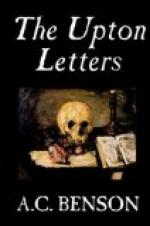Does this seem to you very unreal and fantastic? I do not know; it is very real to me. Sometimes, in dreary working hours, my spirit languishes under an almost physical thirst for such sweetness of sound and sight. I cannot believe that it is other than a pure and holy pleasure, because in such hours the spirit soars into a region in which low and evil thoughts, ugly desires, and spiteful ambitions, die, like poisonous flowers in a clear and wholesome air. I do not say that it inspires one with high and fierce resolution, that it fits one for battling with the troublesome world; but it is more like the green pastures and waters of comfort; it is pleasure in which there is no touch of sensual appetite or petty desire; it is a kind of heavenly peace in which the spirit floats in a passionate longing for what is beautiful and pure. It is not that I would live my life in such reveries; even while the soft sound dies away, the calling of harsher voices makes itself heard in the mind. But it refreshes, it calms, it pacifies; it tells the heart that there is a peace into which it is possible to enter, and where it may rest for a little and fold its weary wings.
Yet even as I write, as the gentle mood lapses and fades, I find myself beset with uneasy and bewildering thoughts about the whole. What was the power that raised these great places as so essential and vital a part of life? We have lost it now, whatever it was. Churches like these were then an obvious necessity; kings and princes vied with each other in raising them, and no one questioned their utility. They are now a mere luxury for ecclesiastically minded persons, built by slow accretion, and not by some huge




